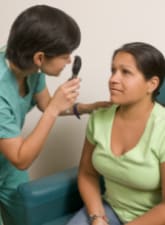Colorado Diabetes Profile
Diagnosed diabetes is prevalent across all 50 states and Washington, DC. People with diabetes are at high risk of heart disease, stroke, and other serious complications, such as kidney failure, blindness, and amputation of a toe, foot, or leg. CDC’s Division of Diabetes Translation (DDT) focuses on preventing type 2 diabetes, reducing diabetes complications and disability, and reducing diabetes-related disparities, which are differences in health across geographic, racial, ethnic, and socioeconomic groups.
View another state
Key Metrics in Colorado
$1.9M
Fiscal Year 2022 Funding
Nationally: $88.5M
345.8K
Total Diabetes Cases (Prevalence)
Nationally: 28.5M
24.9K
New Diabetes Cases (Incidence)
Nationally: 1.4M
10%
Notified of Prediabetes
Nationally: 8.8%
5.8M
State Population
Nationally: 328.2M
$2.6B
per year in direct medical costs attributed to diabetes
Nationally: $237B
$1B
per year in indirect costs attributed to diabetes
Nationally: $90B
Does Colorado Have a Diabetes Action Plan?
No
(28 States Nationally)
Colorado Program Activities
National Diabetes Prevention Program (National DPP)
38
CDC-recognized organizations offering the lifestyle change program
(2.1K Nationally)
9
Medicare Diabetes Prevention Program suppliers
(288 Nationally)
22K
Participants enrolled in the National DPP lifestyle change program
(583K Nationally)
Colorado Medicaid program has some level of Medicaid coverage for the National DPP lifestyle change program
Diabetes Self-Management Education and Support (DSMES)
44
Recognized/accredited DSMES service providers
(2.1K Nationally)
23.8K
People with diabetes with at least one encounter at a recognized/accredited DSMES service
(929K Nationally)
Colorado Highlights
- The Colorado Department of Public Health and Environment launched a marketing campaign for English and Spanish speaking audiences to gather partner insights and help drive a media campaign for the National DPP lifestyle change program. The campaign reached over 66,800 people through evidence-based engagement strategies.
- The Colorado Department of Public Health and Environment worked with the Colorado Coalition for the Homeless to integrate clinical pharmacy services into their clinical workflows to deliver medication therapy management and develop referral criteria for patients who have an A1c level over 9%.
Related Resources

